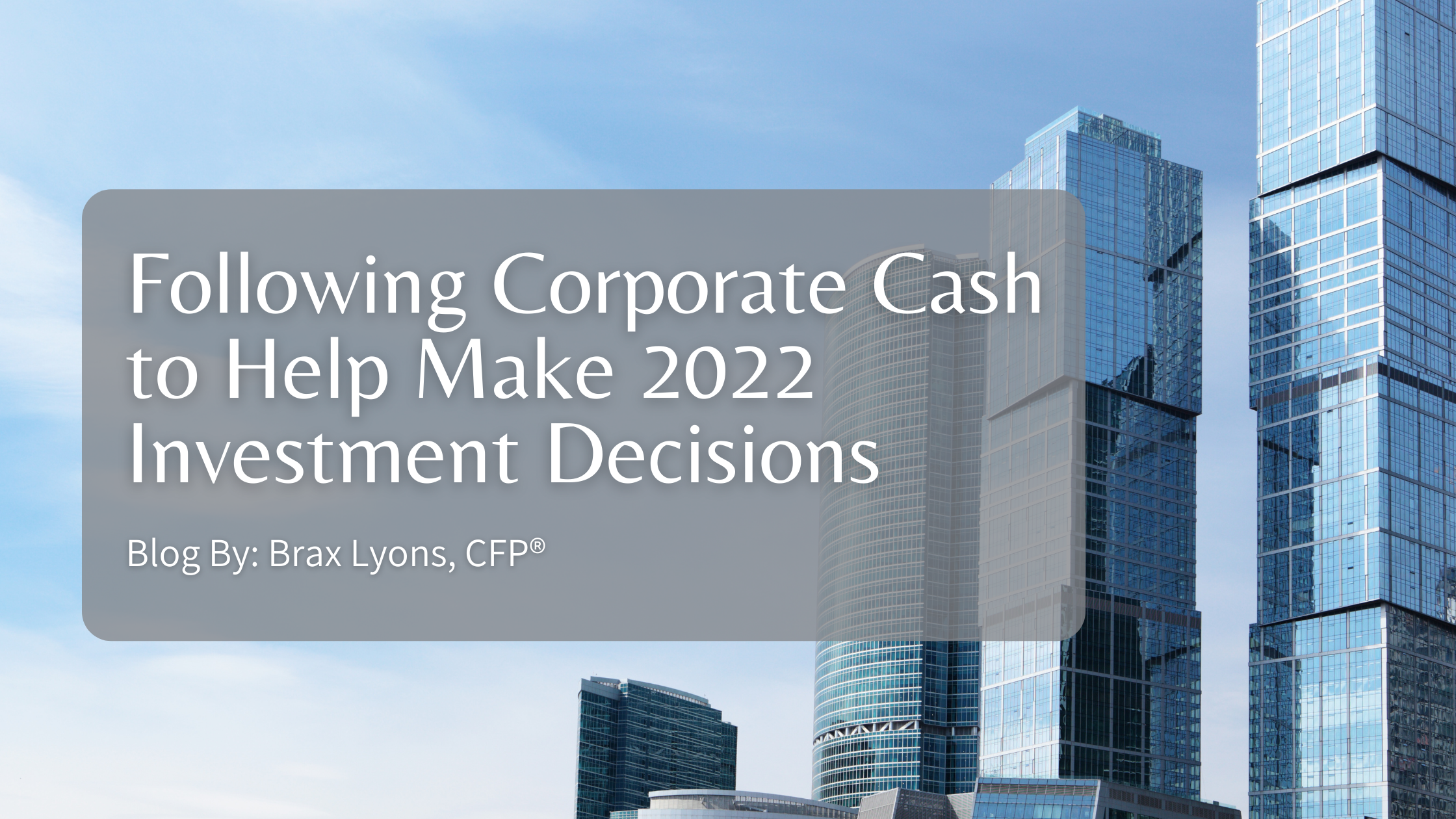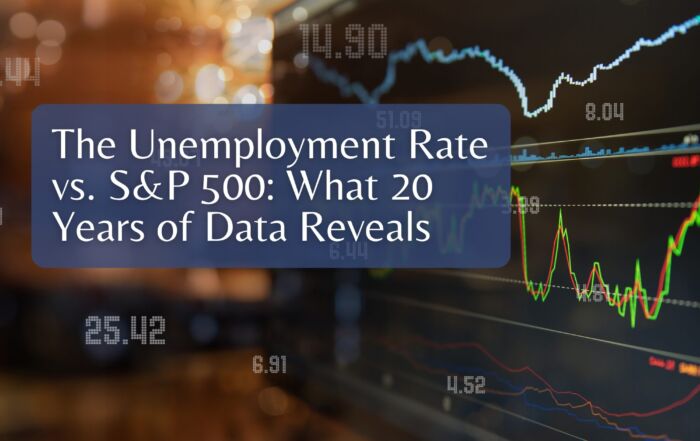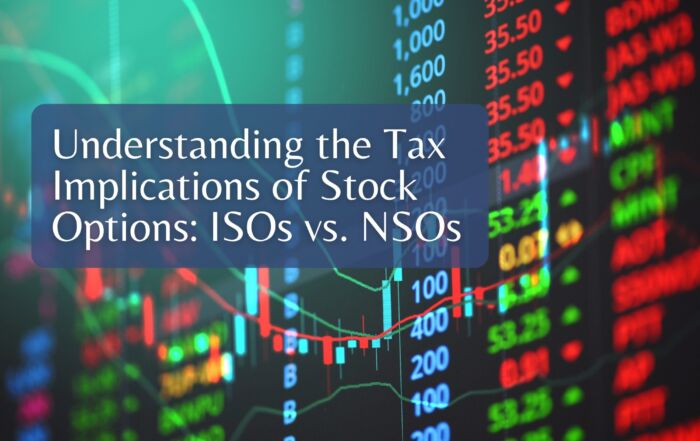Following Corporate Cash to Help Make 2022 Investment Decisions

Portfolios have done well in a world where nothing seems normal, at least not prior to 2020 normal. As we roll into 2022, we see interest rates rising, Coronavirus continuing to cause concern, and supply chain issues bottlenecking distribution. Addressing these issues in a portfolio can make your head spin. Higher interest rates in 2022 should come as no surprise to anyone. The Fed has been telegraphing their intention to raise rates for some time now. Managing public health matters requires the public’s cooperation, but that is notoriously difficult to actually accomplish. Supply chain issues have affected everyone, and unfortunately, there’s no real expectation of any quick or easy solutions. Here is how to follow corporate cash to help make 2022 investment decisions.
How should investors invest new cash considering the current economic and health situation?
Some strategist suggest that the answer may lie in watching where corporate managers allocate their corporate cash hoards. Currently, corporation balance sheets are showing a record $7 trillion of cash. How managers deploy this cash will depend on how they perceive the economic outlook relative to their company’s opportunity to expand their market share and increase their revenues in 2022. Some companies will expand in a low interest rate environment while others will simply try to hold their ground. Once we have some idea of where corporate capital is flowing, investors can respond with their own decisions regarding how and where to allocate their capital.
3 Ways Investors Can Invest Behind Corporate Capital Flows:
1. Look for companies that plan to spend more money on CAPEX (capital expenditures).
Corporate managers that see prospects for long-term growth with moderating inflation and continued unmet demand in 2022 may expand their market share by investing their cash with higher CAPEX to meet that demand. Look for companies that announce plans to increase plant and equipment expenditures, corporate mergers, and acquisitions for potential growth in your portfolio.
2. Look for companies that plan to return more money to shareholders by increasing their dividend payouts and share buyback programs.
Corporate managers that see 2022 as a year with uncertainty surrounding higher interest rates, continued public health concerns, and supply chain issues may plan to return capital to shareholders by increasing their dividend payments and/or share buybacks. In 2021, corporate managers returned a record $511 billion to shareholders through dividend payments. Look for companies that have a record of increasing their dividends year after year for quality investments in your portfolio.
3. Look at companies improving their balance sheets to find those candidates to have their credit rating upgraded.
Corporate managers that are focusing on shoring up their corporate balance sheets may simply sit on their cash or pay off debt with the expectation of seeing their credit rating upgraded with higher free cashflow. An upgraded credit rating can lead to their cost of capital going down making it cheaper to finance future CAPEX and/or see their bond issuances increase in value. Look for companies with junk bonds referred to as ‘rising stars’. This is a bond issue with a rating that has been or is expected to increase because of the issuing company’s improving credit quality. A rising star may still be a junk bond, but it’s on its way to being investment quality. Convertible securities may be another way to invest in companies hoarding cash.
Investors should know early in 2022 where corporate managers are deploying their capital. After which they can make corresponding 2022 investment decisions of their own.
Is one strategy better than another?
I doubt it. How easy is it to research these ideas and find the companies increasing CAPEX or acquiring other companies, increasing their dividends and buybacks, or shoring up their balance sheets? Not very. It can be a full-time job pouring through analysts’ reports and listening to company earnings calls searching for the right investment opportunity. To do this right, there won’t be much time left over for anything else you enjoy doing. However, for investors intent on picking stocks in their portfolio, there are several free resources available on the internet to use for researching ideas. Try Zacks.com for stock and investment research, MoneyWise.com for articles about companies, and Bloomberg.com for up-to-date news and information about the market.
2022 Investment Decisions
Another option is to do what we do here at Wiser Wealth Management. We invest money for our clients in long-term healthy asset classes using passively managed ETFs. ETFs are broadly diversified investments in the companies that are described above. Portfolios investing in ETFs are low cost and easy to manage. For example, investing in ETFs that replicate the return of Standard & Poor’s 500 Index, their 400 Index and 600 Index for a portfolio’s U.S. equity exposure are a great choice for their broad asset class coverage and for their requirement that each company must be profitable to be included in the respective index. By constructing a portfolio with ETFs, investors can cover all the sectors of the economy, including all the companies that are expanding and all those increasing their dividends, along with those improving their balance sheets in a few simple investment decisions. This leaves you with more time to do the things you really enjoy in life.
Have more questions? Contact Us
Brad Lyons, CFP®
Investment Manager
Share This Story, Choose Your Platform!
Wiser Wealth Management, Inc (“Wiser Wealth”) is a registered investment adviser with the U.S. Securities and Exchange Commission (SEC). As a registered investment adviser, Wiser Wealth and its employees are subject to various rules, filings, and requirements. You can visit the SEC’s website here to obtain further information on our firm or investment adviser’s registration.
Wiser Wealth’s website provides general information regarding our business along with access to additional investment related information, various financial calculators, and external / third party links. Material presented on this website is believed to be from reliable sources and is meant for informational purposes only. Wiser Wealth does not endorse or accept responsibility for the content of any third-party website and is not affiliated with any third-party website or social media page. Wiser Wealth does not expressly or implicitly adopt or endorse any of the expressions, opinions or content posted by third party websites or on social media pages. While Wiser Wealth uses reasonable efforts to obtain information from sources it believes to be reliable, we make no representation that the information or opinions contained in our publications are accurate, reliable, or complete.
To the extent that you utilize any financial calculators or links in our website, you acknowledge and understand that the information provided to you should not be construed as personal investment advice from Wiser Wealth or any of its investment professionals. Advice provided by Wiser Wealth is given only within the context of our contractual agreement with the client. Wiser Wealth does not offer legal, accounting or tax advice. Consult your own attorney, accountant, and other professionals for these services.





